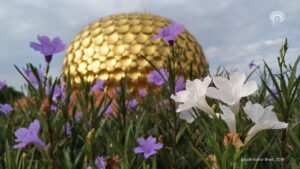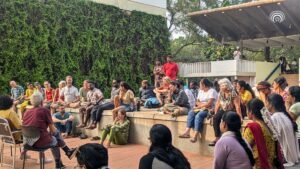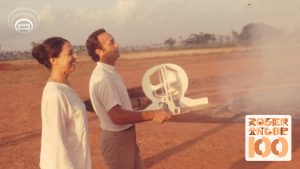Auroville, often referred to as the City of Dawn, stands as a living testament to unity in diversity, sustainability, and conscious living. At the heart of Auroville’s unique governance model are two integral components: the working groups and the Residents’ Assembly. These entities operate in harmony, playing distinct yet interconnected roles in the community’s development and decision-making processes.
Working groups in Auroville are task-specific teams of individuals who voluntarily come together to address various community needs, projects, or issues. These groups embody the principles of collaboration, transparency, and shared responsibility, ensuring that decisions and actions align with Auroville’s values. On the other hand, the Residents’ Assembly serves as a collective decision-making body, where every Aurovilian has a voice and vote in community affairs.
This article delves into the essential connection between Auroville’s working groups and the Residents’ Assembly, elucidating how these entities collaborate to promote community growth, sustainability, and a shared vision of human unity.
The Working Group Model:
Auroville’s working groups operate on a model based on transparency, inclusivity, and collaboration. These principles ensure that every member, regardless of background or experience, has an equal say in the group’s activities and decisions. The project-specific goals are outlined to ensure that every activity aligns with Auroville’s overarching vision.
The Residents’ Assembly:
The Residents’ Assembly serves as the primary decision-making body in Auroville. Composed of all registered Auroville residents, it convenes periodically to discuss and make decisions on community matters, budgets, land use, and policies. The Assembly’s decisions are made collectively, with every member having a voice and vote, promoting a truly democratic approach to governance.
The Working Groups and Residents’ Assembly Connection:
The connection between Auroville’s working groups and the Residents’ Assembly is not merely administrative; it is a reflection of the community’s commitment to collaboration, collective wisdom, and shared responsibility.
1. Working Groups as Initiators:
Working groups often serve as initiators of proposals and projects that are presented to the Residents’ Assembly for approval. These proposals span a wide spectrum of focus areas, from sustainable development to education, cultural enrichment, and healthcare. The working groups’ members bring their expertise and project plans to the Assembly, seeking the community’s collective wisdom and consent to move forward.
2. Collaborative Decision-Making:
The working groups’ proposals are thoroughly discussed in the Residents’ Assembly meetings, where all members have an equal say and vote. This democratic approach ensures that projects align with Auroville’s values and are driven by the collective wisdom of its residents. The Assembly serves as a forum for open and inclusive discussions, providing valuable feedback and insights.
3. Shared Responsibility:
Once a project is approved by the Residents’ Assembly, it becomes a shared responsibility of the entire community. Aurovilians, irrespective of their involvement in the working groups, contribute to the project’s success. This shared responsibility instills a sense of ownership among the residents, ensuring that projects are executed with purpose and efficiency.
4. Transparency and Accountability:
The collaborative relationship between the working groups and the Residents’ Assembly is based on transparency and accountability. All meetings, decisions, and financial matters are open and accessible to every member, fostering trust and confidence in the governance system.
Success Stories of Collaboration:
The connection between the working groups and the Residents’ Assembly has yielded numerous success stories that reflect the community’s commitment to growth and sustainability.
1. Sustainable Development: Auroville’s commitment to sustainable architecture and eco-friendly practices has led to the creation of environmentally responsible buildings and structures. The Sustainable Architecture Working Group has played a pivotal role in influencing not only the community but also the region, setting an example for sustainable urban development.
2. Holistic Education: Educational working groups have introduced innovative learning opportunities that align with Auroville’s commitment to holistic education. Their efforts have nurtured the intellectual and spiritual growth of individuals from diverse backgrounds, reinforcing the community’s vision of integrative education.
3. Cultural Enrichment: Cultural working groups have organized festivals, exhibitions, and cultural exchanges that celebrate diversity and promote intercultural dialogue, fostering unity among residents and inspiring cultural enrichment both within and beyond the community.
4. Environmental Conservation: Auroville’s commitment to environmental preservation and reforestation is reflected in the initiatives of the Reforestation Working Group. Their efforts have led to increased biodiversity and ecological sustainability in the region.
5. Comprehensive Well-being: Healthcare working groups have ensured that residents have access to holistic health services, wellness programs, and spiritual well-being practices. Their initiatives reflect Auroville’s commitment to physical, mental, and spiritual health.
Lessons for Collaborative Governance:
The connection between Auroville’s working groups and the Residents’ Assembly offers valuable lessons for collaborative governance in communities worldwide.
1. Inclusivity and Equal Participation: The success of Auroville’s model highlights the importance of inclusivity and equal participation in decision-making processes. All members, regardless of their background or experience, have an equal say and vote, fostering a sense of unity and shared responsibility.
2. Collaborative Decision-Making: Collaborative decision-making, where community members discuss and approve proposals collectively, promotes a sense of ownership and trust. It ensures that projects align with the community’s values and vision.
3. Shared Responsibility and Accountability: Shared responsibility among community members and working groups promotes accountability and transparency. The entire community contributes to the success of projects, creating a culture of shared ownership.
4. Transparency and Trust: Open and transparent governance processes build trust among community members. Trust is essential for effective collaboration and the successful execution of community projects.
Conclusion:
Auroville’s working groups and the Residents’ Assembly exemplify the power of collaboration, shared responsibility, and democratic decision-making. Their connection is not only a reflection of the community’s commitment to unity in diversity, sustainability, and conscious living but also a blueprint for collaborative governance in communities worldwide.



